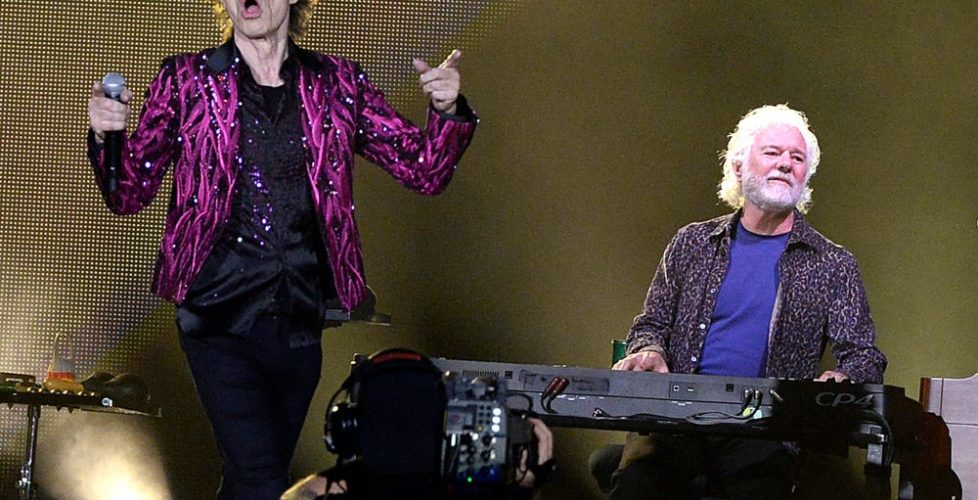I’ve played keyboard for The Rolling Stones for 40 years — here’s what my life is like on and off tour

By 1982, at the age of 30, I’d already spent half of my life working my way up the ranks of the music industry.
Music played an integral part in my life ever since my childhood days when I’d tug on my mother’s skirt and beg her to play the piano for me. When I was 13 and saw Ray Charles perform live, I remember walking away thinking out of all the professions in the world, that’s what I wanted to be.
I spent my teenage days performing at the local YMCA near my home in Tuscaloosa, Alabama
I joined The Allman Brothers Band in 1972 when I was 20 and played with them for four years until they temporarily disbanded in 1976. After the breakup, I formed the rock/jazz/blues fusion group Sea Level with Allman’s drummer Jaimoe. We released five critically acclaimed albums and toured relentlessly.
But in 1982, for the first time in a long time, things were beginning to slow down and the phone was ringing less and less.
The year before, my wife Rose Lane had inherited Charlane Plantation, a 1,000-acre parcel of land in Dry Branch, Georgia, from her grandmother. Although we intended to keep the land, we didn’t know exactly what we were going to do with it.
One afternoon, I came home frustrated and began venting about how the phone wasn’t ringing and maybe it was time to just forget about music for a while.
When I was done ranting, my wife informed me that while I was out, the legendary rock concert promoter Bill Graham, known for his work with The Grateful Dead and Jefferson Airplane, had called to see if I’d be interested in auditioning as the principal keyboardist for The Rolling Stones. I’ve been recording albums and touring all over the world with the band ever since.
People are always surprised by how much downtime there is on tour
Before the pandemic, one of the things I loved most was that my wife would often travel with me and we’d have the chance to visit friends all over the world.
COVID-19 forced us to be more creative when it came to downtime on the tour since we were in a tight bubble. While I was able to enjoy the occasional meal out in a few cities, I spent most of the time in my hotel room on my computer preparing for our upcoming activities at Charlane, which is now a nature preserve and lodge. I even bought a vintage 1953 Willys M170 Jeep one day while browsing on Facebook. I plan to have it converted into a hunting vehicle with dog boxes and shotgun boxes.
I always have a portable full 88-key keyboard with built-in speakers with me so I get practice in. On tour, we always do sound checks the afternoon of a show and often practice certain songs then.
In addition to being the band’s principal keyboardist, the guys have bestowed upon me the title “musical navigator,” which comes from my practice of documenting most everything we do during rehearsals, from keeping set lists to setting the pace for songs through hand signals and conducting.
Charlie Watts often relied on my signals, so I grew used to looking across the stage and catching his eye while we played. Charlie and his wife owned a big horse farm in England, so we’d often talk about the outdoors and environmentalism during downtime. During the tour that we just wrapped up over Thanksgiving, it was hard looking across the stage and not seeing him anymore.
Over the last 10 years, our tours have become much shorter, so I’m home on our tree farm most of the year
I’m usually out there on my tractor from sunrise to sundown, working the land. Charlane Woodlands & Reserve has expanded to triple its original size, and in 1999 we were recognized as the National Outstanding Tree Farmers of the Year.
Throughout the year, we keep busy managing our various tracts of timber doing things like prescribed burns at the right time of year, maintaining our network of roads, and thinning and harvesting.
We also have a staff and run a lodge that accommodates overnight guests, small retreats, and events. We offer horseback trail rides, hunting experiences, and sometimes have children’s groups that visit to learn about nature and sustainable forestry.
Now that The No Filter tour is over, I’m jumping right into our hunting season. Over the years, in addition to my work as a tree farmer, I’ve written three books about tree farming and conservation work, cofounded The Mother Nature Network, was featured in a documentary called “The Tree Man,” and currently host a PBS show about sustainable forestry called “America’s Forests with Chuck Leavell.”
No one knows how much longer we’ll be playing and going on tour
We’re obviously toward the end of the journey, but it’s not over yet. We don’t take touring lightly — it isn’t just a job to us. Each one of us is acutely aware of just how blessed we are to be able to do this as long as we have.
Every time we hit the stage, we get up there and say, “Wow, can you believe we get to do this again night after night?”
